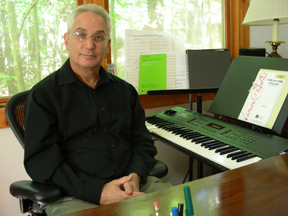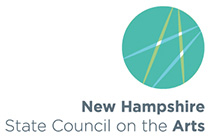|
Lawrence Siegel, Composer, Westmoreland
By Jane Eklund
 “This is the beginning of the story,” says Larry Siegel, leading the way up a short path from his house to a remote studio. The house itself is already remote – down a street that winds through the town of Westmoreland, up a long dirt road and over the crest of a hill, then a thousand feet up a steep dirt driveway. “This is the beginning of the story,” says Larry Siegel, leading the way up a short path from his house to a remote studio. The house itself is already remote – down a street that winds through the town of Westmoreland, up a long dirt road and over the crest of a hill, then a thousand feet up a steep dirt driveway.
“This choice of life here in a rural village in New Hampshire, and a studio in the woods, and a life that’s not focused on a teaching job, but on project-based work, was borne 25 years ago at the MacDowell Colony,” Larry says says.
And while, unlike residents at the prestigious Peterborough retreat for artists, he has to make his own lunch, he finds the same quiet and inspiration in the studio beyond his home.
The State Arts Council is a big part of the story of Larry’s life as a composer. Back in 1990, he answered the agency’s call for proposals for projects celebrating life in rural New Hampshire. That led to “Village Store Verbatim,” a “folk opera” co-written with Valeria Vasilevski. While he was putting “Village Store” together, he had a brainstorm about doing similar projects, but conducting them as residencies during which community members would do the writing and performing.
Since then, he’s done about 25 Verbatim projects under the aegis of Tricinium, his nonprofit organization. (Verbatim is defined on his web site as “A musical theatre piece whose text comes directly, word-for-word, from gathered dialogue. A program in which such a piece is created and performed by members of a community.”) “That became my day job, and my teaching job,” he says.
That’s part of the public aspect of his work, along with conducting and with staging pieces of his own creation (most recently he mounted “Kaddish,” a song cycle about the Holocaust, which debuted in May at Keene State College and is now touring).
The private aspect – composing in his studio – is the one he plans to nurture with his fellowship. “I definitely have in mind writing chamber music,” he says. He’s percolating on a couple of trios for musicians he knows.
Larry came to composing comparatively late in his school career, though he’d been playing piano since the age of three. Growing up in assorted places around the United States, he listened to classical and folk music. “And I would really listen,” he says. “It was very meaningful to me. There’s some call of music. It was from inside, a real visceral response to music.”
During his college years, he spent some time studying piano in Italy – and came to the realization that he didn’t want to pursue a career as a concert pianist. When he returned to the City College of New York, he consulted with a professor, who pointed him toward composition. He went on to graduate school at Brandeis University, earning a doctorate in music theory and composition and making a couple of forays to MacDowell, which prompted him to forge his sometimes solitary life. It’s not too solitary, though; while his studio is isolated, he shares his house with his family. His wife, Leigh Marthe, is a poet who works as a district coordinator for Congressman Paul Hodes; children Julian, three, Jonah, nine, and Clair, 18 (a student at Plymouth State) are all musical, he notes.
“I’ve made it a point to live an artist’s life,” Larry says – and he’s done it in a way that expands the function of art. The mission of the nonprofit Tricinium, for instance, is to harness the power of the arts to nurture civic engagement. His collaborative projects offer communities, organization and schools unthreatening ways to look at and talk about difficult issues or to raise questions – in addition to celebrating themselves.
It’s not surprising that the toughest question for Larry to answer on grant applications is: “What kind of music do you write?”
It all depends on the circumstances and the context, says the composer. In his Verbatim pieces, the conversations among participants trigger the type of music that he selects. “I make an effort to use genre of music as a compositional element,” he says. “My style is as many styles as possible.”
On the web: www.tricinium.com
Back
to 2009 Fellows page
Photo by Jane Eklund, NHSCA
Last
updated:
September 17, 2008
|

